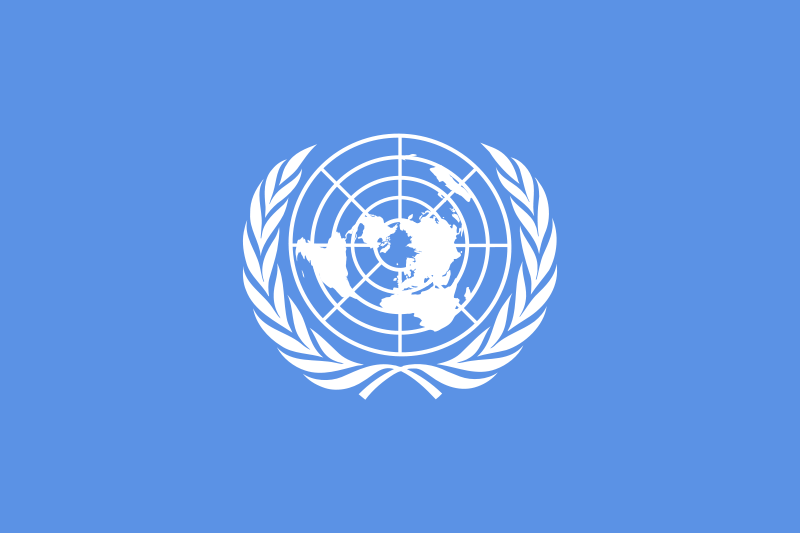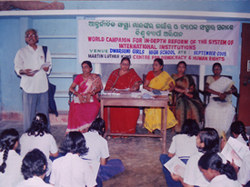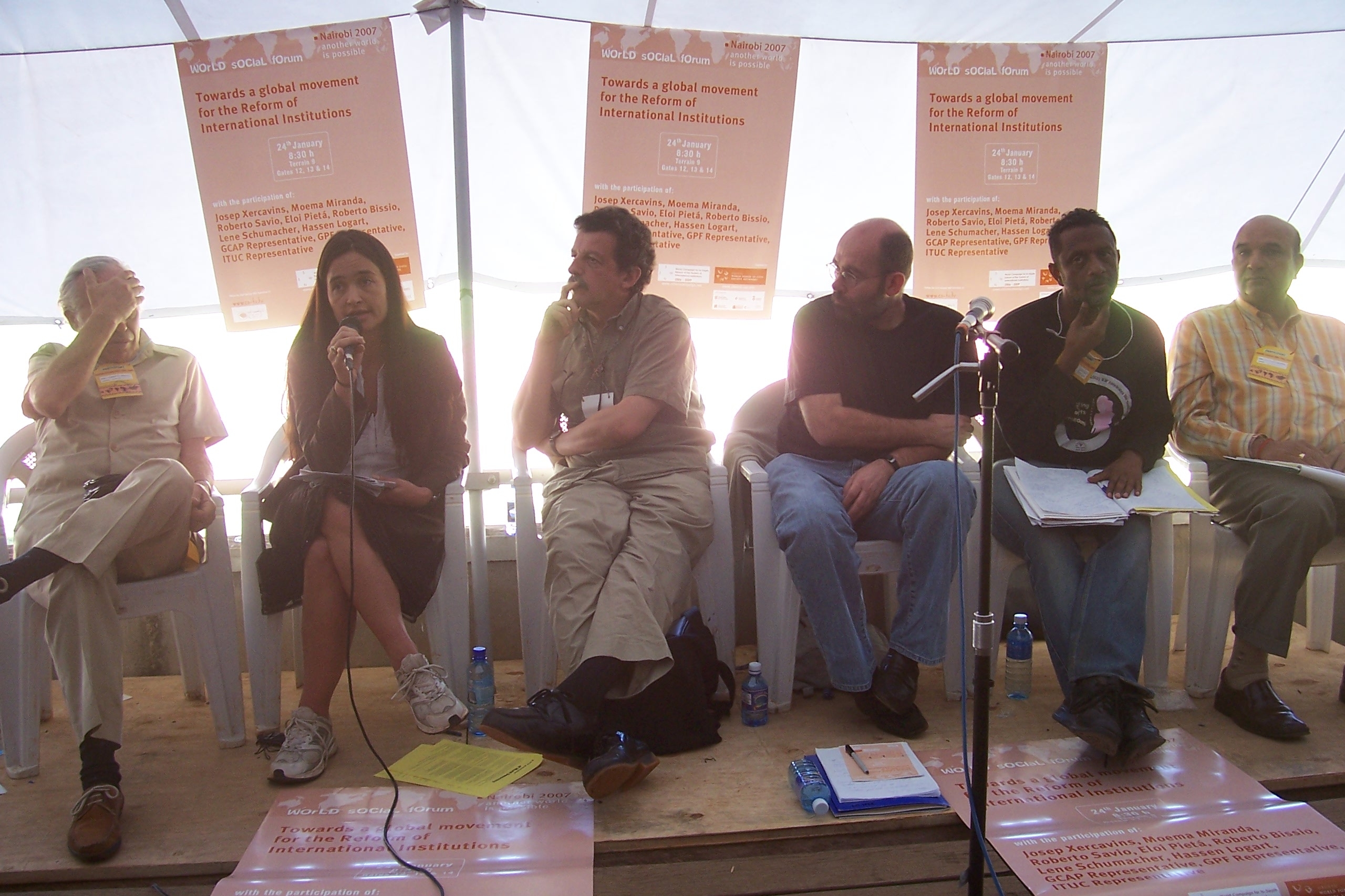World Campaign for in-depth Reform of the System of International Institutions
 |
|
| Name: | World Campaign for in-depth Reform of the System of International Institutions |
| International Organization: | United Nations, IMF, WB, WTO. |
| Active: | Yes |
| From: To: | 2002 - |
| Promoters: | UBUNTU - World Forum of Civil Society Networks |
| Supporters: | Personalities, city councils, international organizations, accademia and media, citizens. |
| Aim: | Democratic governance of globalisation |
| Official web site: | http://www.reformcampaign.net |
| Focus: |
Summary:
- Organisational structure of the campaign
- Manifesto for in-depth reform of the system of international institutionsWHY THE CAMPAIGN?
 Humanity is facing particularly grave problems and challenges at present: we still have not achieved peace and security based on justice and freedom in the world; huge numbers of our planet's inhabitants live in deplorable conditions of poverty; the rich countries continue to be shackled to a model of economic growth whose impact on the environment jeopardises the sustainability of life for future generations; the loss of cultural diversity is impoverishing, perhaps irreversibly, one of humanity's most important characteristics.
Humanity is facing particularly grave problems and challenges at present: we still have not achieved peace and security based on justice and freedom in the world; huge numbers of our planet's inhabitants live in deplorable conditions of poverty; the rich countries continue to be shackled to a model of economic growth whose impact on the environment jeopardises the sustainability of life for future generations; the loss of cultural diversity is impoverishing, perhaps irreversibly, one of humanity's most important characteristics.
The process of globalisation intensifies the interrelations and interdependence of the world's problems and challenges. As a result, what happens on a global scale has a decisive influence that, on a local level, affects the life of each and every citizen of the world. Moreover, the globalisation process is leading to a weakening of political authority: while markets are becoming increasingly global, the influence of political institutions required for their democratic, equitable and efficient functioning decreases every day.
In such a context, the breakdown of the international system of peace and security -made clear most recently by the war in Iraq and the unilateral course of action embarked upon by the world's leading power- has caused widespread turmoil, with serious consequences for the System of International Institutions, particularly the United Nations. Unilateral action in questions of peace and security has become part of the global equation, making in-depth reform of the world's institutional system even more necessary and urgent.
 Multilateral international policies intended to resolve the severe development problems affecting the world fail to be implemented due to a lack of political will and of the financial resources called for. Very few of the hopes raised by the UN summits in the 1990s and the United Nations Millennium Summit (including the Millennium Development Goals) are being fulfilled. The United Nations does not have the ability or the possibilities required to confront these development issues, responsibility for which seems to have been shifted onto the market, mainly through policies promoted by the Bretton Woods institutions and the World Trade Organization.
Multilateral international policies intended to resolve the severe development problems affecting the world fail to be implemented due to a lack of political will and of the financial resources called for. Very few of the hopes raised by the UN summits in the 1990s and the United Nations Millennium Summit (including the Millennium Development Goals) are being fulfilled. The United Nations does not have the ability or the possibilities required to confront these development issues, responsibility for which seems to have been shifted onto the market, mainly through policies promoted by the Bretton Woods institutions and the World Trade Organization.
Faced with this situation, people all over the world are beginning to claim their democratic entitlement to participate in decisions that affect their lives so directly. Global Civil Society should play a key role in promoting the democratisation of the System of International Institutions. This Campaign therefore intends to encourage a series of reforms of International Institutions towards a global system of democratic governance, through representative procedures involving the participation of all the actors in the global arena. Its objective is to contribute to the creation of a consistent, transparent, responsible and effective global architecture, based on developing international legislation with widely accepted democratic value and legitimacy. At the heart of this System would be a stronger, more democratic United Nations Organisation, with effective control over all its bodies and agencies and over global multilateral organisations. An institutional system that would in this way contribute to building a fairer, more equitable, diverse, sustainable and peaceful world.
CAMPAIGN OBJECTIVES
To ensure that a process of in-depth reform of the System of International Institutions gets underway;
to generate concrete and specific reform processes that are effective for themselves and that, within a coherent framework, contribute to the in-depth reform process.
To involve the maximum possible number of actors in the global arena in this process: international institutions, different levels of government and Civil Society in its broadest sense.
To involve key actors in the current political momentum in the World Campaign: the world of parliamentarians and their international organisations; the world of local authorities and their international organisations; governmental groups and regional and sub-regional groups linked to them; sub-state political bodies; related media; other branches of international Civil Society (i.e. the Corporate Social Responsibility Movement); etc.
To continue to draw up proposals within Civil Society (and/or jointly with other actors) based on the conceptual, intentional and methodological foundations of the reform.
To contribute to the construction of an international social and political movement capable of generating the process or processes of reform.
CAMPAIGN GUIDELINES
In order to achieve all of these things, we will focus on:
Raising awareness among public opinion of the need and importance of an in-depth reform of the System of International Institutions in order to move towards global democratic governance and in this way to contribute to solving the serious problems and challenges facing the world.
Carrying out activities and obtaining the support of global public opinion using the usual mechanisms. Continuing to implement tools on the Internet in order to collect signatures in support of the Campaign that are as diverse, representative and numerous as possible. Directing actions intended to gain the global public support not only of individual citizens, but also, and very importantly, to gain the broadest and most diverse support possible from Civil Society organisations throughout the world, in order to have them as part of the Campaign.
Setting up committees and/or groups of focal points to promote the Campaign at all possible levels (regional, state, sub-state, local, sectorial, etc.) that contribute in a more active way to attaining the objectives of the Campaign and that are representative of it, not only as instrumental means, but also as explicit objectives of the Campaign, since their existence will really mould a World Campaign.
Channelling the pressure of global public opinion to the international powers (international organisations, different levels of government, participants in the global economic scene, etc.) in terms of the importance and the need for in-depth reform.
Carrying out all types of events (meetings, consultations, debates and activities in general) aimed at the presentation, dissemination, extension, debate and increase of support for the Campaign, at drawing up proposals and, in general, at achieving each and every one of the Campaign objectives.
In addition to these things, efforts will be made within the agenda of the Campaign to begin processes intended to:
Create a "World Commission for In-Depth Reform of the System of International Institutions" that, linked clearly and explicitly to the Campaign, would assume and exercise the role of "lobbyist" for the Campaign. To this end, contacts would be made and developed with the intention of establishing a dialogue with the United Nations System, other international organisations, different levels of government and other important groups in the world sphere.
Establish points of contact with the media in order to strengthen the dissemination and all other aspects of the Campaign. In addition to this, where possible, the Campaign should develop its own instruments of communication.
Channel the dynamics of the Campaign, wherever possible and at different territorial levels, towards debates and the adoption of favourable and explicit positions on the part of parliaments, city councils, different levels of governments, social movements and organisations, etc.
Use the existing possibilities to promote explicit "internal" debates on the issue within the International Institutions themselves (i.e. promoting an annual meeting of the DPI-NGO that focuses on this point; working to introduce these themes as points on the agenda firstly at ECOSOC meetings and then at ECOSOC meetings with the Bretton Woods Institutions and the WTO, etc.).
Work on ensuring that the Campaign's conclusions be presented to the UN General Assembly and on preparing a petition to convene a world conference on the in-depth reform of the System of International Institutions.
ORGANISATIONAL STRUCTURE OF THE CAMPAIGN
The working bodies of the Campaign are:
All of the organisations and individuals who have joined the Campaign and who promote it in one way or another.
Organising Committee: Made up of organisations and individuals who, in addition to promoting the Campaign, work specifically on defining its objectives and on its conceptual and strategic development. The Coordinating Committee of the UBUNTU Forum and the members of its Ad Hoc Secretariat are also members of the Organising Committee. Specific working committees with appropriate methodologies for particular themes may be created.
Committees and/or focal points promoting the Campaign: at every possible level (regional, state, sub-state, local, sectorial, etc.) that contribute to attaining the Campaign objectives more actively and that act as benchmarks within the Campaign. They will report directly to the Ad Hoc Secretariat of the Campaign.
Sources of funding that are in line with the Campaign objectives will be sought. In any case, there will be total transparency with regard to the origins of funds received.
WHO SUPPORTS THE CAMPAIGN?
The Campaign is being promoted by UBUNTU - World Forum of Civil Society Networks and was launched at the World Summit on Sustainable Development held in Johannesburg in 2002. It is now supported by more than � international civil society networks and 50 leading figures and intellectuals, people from the world of academia and communication, among them:
The Campaign is being promoted by UBUNTU - World Forum of Civil Society Networks and was launched at the World Summit on Sustainable Development held in Johannesburg in 2002. It is now supported by more than … international civil society networks and 50 leading figures and intellectuals, people from the world of academia and communication, among them:
Personalities, Intellectuals
International Organisations
| Advocacy for Women in Africa |
| Alliance for a Responsible, Plural and United World |
| AMARC ALC - Asociación Mundial de Radios Comunitarias, América Latina y Caribe |
| Arab Organization for Human Rights |
| Articulación Feminista Mercosur |
| Asociación Naciones Unidas España - Latinoamérica |
| AWEPON - African Women's Economic Policy Network |
| Bretton Woods Project |
| Center for War / Peace Studies, Inc. |
| Center of Concern |
| Centro Internacional para la Cultura Democrática |
| CETRI - Centre Tricontinental |
| Community Organizations Development Institute |
| CONGO - Conference of NGO's in Consultative Relationship with UN |
| CRIS - Communication Rights in the Information Society |
| DAWN - Development Alternatives with Women for a New Era |
| Earth Charter |
| EarthAction |
| Economic Policy Institute |
| EURALAT - Observatorio Latinoamericano sobre el Desarrollo Democrático y Social |
| European Centre for Conflict Prevention |
| Federation of African Women's Peace Network |
| Federation of Human Rights Centers in Arab World |
| FEMNET - The African Women's Development and Communication Network |
| Foreign Policy in Focus |
| Forum Asia - Asian Forum for Human Rights |
| Forum International de Montréal (FIM) |
| Friedrich Ebert Stiftung |
| Fundación Cultura de Paz |
| Fundación Global Democracia y Desarrollo |
| Global March Against Child Labour |
| Global Movement for Children |
| Global Policy Forum |
| Global Youth Action Network |
| Grameen Bank |
| Green Cross International |
| Health Global Access Project (GAP) |
| IATP - Institute for Agriculture and Trade Policy |
| ICAE - International Council for Adult Education |
| ICSFD - International Civil Society Forum for Democracy |
| IGTN - International Gender and Trade Network |
| IMCS - MIEC - International Movement of Catholic Students |
| Institut Internationale Jacques Maritain |
| Intermón Oxfam (Oxfam International) |
| International Physicians for the Prevention of Nuclear War |
| IPB - International Peace Bureau |
| Justice and Peace Europe |
| Linguapax Institute |
| Mandat International |
| Médecins du Monde International |
| MOCASE / Via Campesina |
| NEF - New Economics Foundation |
| NIGD - Network Institute for Global Democratization |
| One World Trust |
| Pax Romana / ICMICA |
| PDHRE - Peoples Movement for Human Rights Learning |
| Social Alert |
| Social Watch / Instituto del Tercer Mundo |
| Society for International Development (SID) |
| Solidar |
| South Centre |
| State of the World Forum |
| Tavola della Pace |
| Tellus Institute |
| The Hague Appeal for Peace |
| Third World Network |
| Transcend |
| United Way International |
| UNPO - Unrepresented Nations and Peoples Organisation |
| WACC - World Association for Christian Communication |
| WFM - World Federalist Movement / Institute for Global Policy |
| World Assembly of Youth |
| Youth for Unity and Voluntary Action |
Academia and Media
| Abdullahi An-Na'im | School of Law, Emory University |
| Dennis Brutus | University of Pittsburg |
| Gilberto Dupas | Instituto de Estudos Avançados |
| Eva Egron-Polak | Association Internationale des Universités |
| Richard A. Falk | Princeton University, Emeritus Professor of International Law |
| John Foster | Social Watch / Instituto del Tercer Mundo |
| John Foster | The North-South Institute |
| Franklin García Fermin | Universidad Autonoma de Santo Domingo |
| Donald Gerth | California State University |
| Antoni Giró i Roca | Rector Universitat Politècnica de Catalunya |
| Oded Grajew | Instituto Ethos de Empresas e Responsabilidade Social |
| Rafael Guarga | Asociación de Universidades Grupo Montevideo |
| David Held | London School of Economics |
| Hazel Henderson | Writer |
| Cândido Mendes | Universidade Cândido Mendes |
| Kinhide Mushakoji | Chubu Institute of Advanced Studies |
| Sami Nair | Université de Paris |
| Adil Najam | Boston University |
| Santiago J. Ramentol | Universitat Autònoma de Barcelona |
| Ferran Requejo | Universitat Pompeu Fabra |
| Saskia Sassen | Columbia University, Professor |
| Roberto Savio | IPS - Inter Press Service International Association |
| Vandana Shiva | Research Foundation for Science, Technology and Ecology |
| Gordon Smith | Centre for Global Studies |
| Andrew L. Strauss | Widener University |
| Alain Touraine | Sociologist |
| John Trent | University of Ottawa |
| Carlos Tünnerman | Instituto Latinoamericano de Educación para el Desarrollo |
| José Vidal-Beneyto | Amis du Monde Diplomatique |
| Josep Xercavins i Valls | Universitat Politècnica de Catalunya |
MANIFESTO FOR IN-DEPTH REFORM OF THE SYSTEM OF INTERNATIONAL INSTITUTIONS
We, citizens of the world, determined to safeguard future generations from war, poverty, injustice, cultural uniformisation and environmental degradation,
DECLARE the particular seriousness of the problems and challenges facing humanity and, in particular, that
the globalisation process is increasing the interdependence and complexity of world problems and widening the gap between rich and poor people; whilst markets become increasingly global, the influence of political institutions required for their democratic, equitable and effective functioning decreases every day
the weakening and marginalisation of the system of international institutions as regards peace and security issues has led to unilateral use of force in recent armed conflicts (Iraq), than promoting conflict resolution collectively and in accordance with processes and protocols established through the UN.
In this state of the affairs, we citizens proclaim that a fairer world is possible, and we reclaim our democratic entitlement to participate in global decisions that affect our lives every day. To this end, we
PROPOSE in-depth reform of the system of international institutions to guarantee:
democratic governance of globalisation to contribute to resolving the grave problems and challenges that face our world;
the eradication of poverty and the promotion of more equitable development and respect for cultural, natural and gender diversity;
world peace and security, embracing human and environmental security, based on justice and freedom; and
the establishment of mechanisms to enable the world's citizens and civil society organisations to achieve direct representation and participation in global decision-making processes.
The pursuit of these goals requires a stronger, more democratic UN, placed at the centre of a consistent, democratic, responsible, effective system of international institutions. More specifically, we need to democratise the composition and decision-making procedures of UN bodies and agencies to ensure that they are effective and democratic. And we need to reform and integrate within the UN all other global multilateral organisations (IMF, WB, WTO, etc.). To achieve these objectives,
WE PROMOTE a process of:
Mobilisation of the world's citizenry based, for example, on citizens and world organisations' support for this manifesto so that it comes to the formal attention of the United Nations General Assembly, with a request to call a world conference on the in-depth reform of the system of international institutions.
Official Web site
